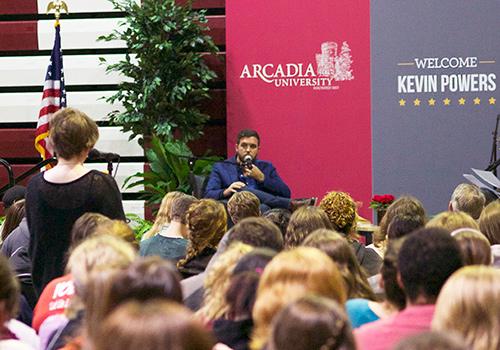Author Kevin Powers Discusses War, Writing, and ‘The Yellow Birds’ at Arcadia

By SHANI CARRINGTON ’18 After returning from serving two tours in Iraq, Kevin Powers realized that people wanted to know what it was like “over there.” He decided he would show them through his novel The Yellow Birds, the Common Read selection for students in Arcadia University’s Class of 2018.
On Oct. 8, Arcadia students filed into the Kuch Center Alumni Gymnasium to participate in a book discussion with Powers. While he had spoken to students with concentrations in creative writing earlier that day in a more intimate setting, the evening discussion was open to all students regardless of major or year of study.
The Yellow Birds tells of a young soldier who attempts to not only survive his service in the Iraq War, but also protect the younger soldier he promised to bring home safely. A national bestseller, the novel was chosen as the One Book One Philadelphia selection and won the Guardian First Book Award, the Hemingway Foundation/PEN Award, the Sue Kaufman Prize, the Anisfield-Wolf Award, and it was a finalist for the National Book Award, the Young Lions Fiction Award, and the Flaherty-Dunnan First Novel Prize.
After an introduction by President Nicolette DeVille Christensen, Powers read the first few paragraphs of his book and discussed themes including solitude and the self-isolation many veterans feel and display upon their return home. Pointing to himself as an example, Powers spoke about the difficulties he faced in making personal connections during his first times back on a university campus after his honorable discharge at 26, having enlisted in the U.S. Army at 17.
Peter Siskind, PhD, chair of the Department of Historical and Political Studies and assistant professor of history, led questions to prompt Powers before students began asking questions.
While some posed questions regarding current events in the Middle East, many were curious about Powers’ thoughts when writing The Yellow Birds. Powers explained that the book’s lack of chronological order and use of flashbacks paralleled the main character’s thoughts, which he noted were fractured due to traumatic experiences from combat. Wishing to display the emotional turmoil that war causes and the consequences that are apparent even after the initial killing and bloodshed is over, Powers hoped that his story would help people “see the person behind the uniform” and realize that soldiers were normal people too.
Another student did not shy away from criticising Powers, challenging him about the stereotypical roles women played in the novel. He contended that the women in the book were there to realistically portray those in whom a young soldier would search for solace (i.e., roles of a mother, a nurse, a prostitute).
When asked if The Yellow Birds had any political ties or had been used by anyone for political reasons, Powers stated that he had no explicit political agenda when he wrote the book. Although, he was not sure if anyone had used it for political gain since he had not read reviews of the book, he said, eliciting laughter from the audience.


